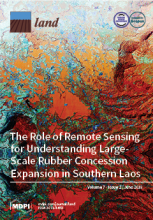Land Library
Welcome to the Land Portal Library. Explore our vast collection of open-access resources (over 74,000) including reports, journal articles, research papers, peer-reviewed publications, legal documents, videos and much more.
/ library resources
Showing items 1 through 9 of 10.Agricultural land is a limited natural resource with increasing economic value.
This article evaluates the impacts of land ownership on the economic performance and viability of rice farming in Thailand, and explores whether they are heterogeneous across different types of farming while using the propensity score matching (PSM) technique.
The ownership of agricultural land has important implications for food systems, the environment, farmer livelihoods, and rural economies, communities, and landscapes.
Statutory recognition of rural communities as collective owners of their lands is substantial, expanding, and an increasingly accepted element of property relations.
In this article, we argue that research on land reform in the nation of Zimbabwe has overlooked possibilities of integrating geospatial methods into analyses and, at the same time, geographers have not adequately developed techniques for this application.
A landscape perspective is generally recognized as essential for conservation biology. The main underlying reason is that species respond to features of the landscape at various spatial scales, for example habitat area, connectivity, and matrix habitats.
This case study has been produced in response to a request to the Evidence on Demand Helpdesk. The objective of the request was to provide a detailed case study on the approach taken to land tenure reform by the DFID-funded Land Tenure Regularisation Programme (LTRSP) in Rwanda.
After remarkable social and economic reconstruction since 1994, Rwanda aspires to become a middle income country by 2020 with a strong focus on inclusive growth. In this context the Government of Rwanda (GoR) has recognized the critical nature of land policy and agricultural growth.
This paper examines land tenancy systems and tenant contracts in Rwanda, with
respect to socioeconomic contexts. Our research in southern and eastern Rwanda produced
data suggesting that land borrowing with fixed rents has been generally practiced, and that rent







